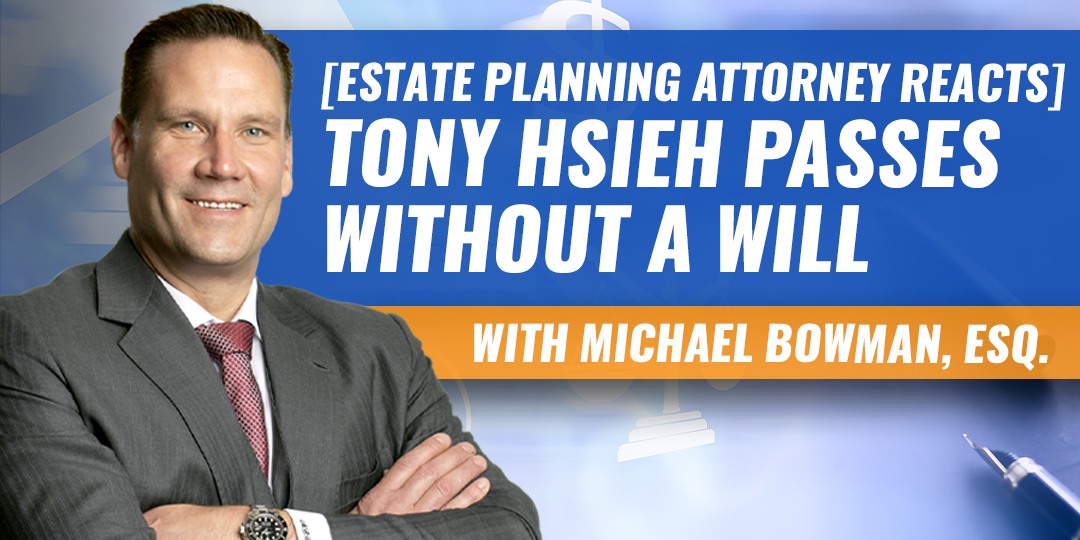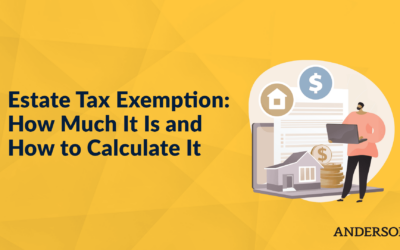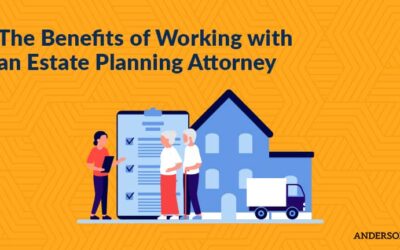Tony Hsieh, Legendary eCommerce Mogul & Las Vegas Figure, Passes with No Will or Estate Plan
Estate planning attorney Michael Bowman, Esq. explains why we all need estate planning and why so many people avoid it.
Updated October 1, 2021
Recently, Tony Hsieh passed away in an unfortunate and tragic accident, and this news kind of sparked one of those things that we have to deal with quite a bit being in the estate planning field.
The fact is, we’ve got too many clients who pass away without having announced estate plans. Not to mention all the celebrities who have passed without any estate plans in place — Prince, Kurt Cobain, Howard Hughes, just to name a few.
What we’ve seen with those estates is that it just causes unnecessary strife and hardship on the people left behind to pick up the pieces.
It was recently reported that Tony Hsieh possibly died without a will, and he is worth about $840 million. So, what I wanted to do today was go through why an estate plan is so important — whether you’re a millionaire or not.
My hope is that many of you will go out and take action and get an estate plan put together so that your families are protected from hardship.
The main purpose of an estate plan is to make everything as smooth as possible and help the heirs get ahead with a peaceful transition. The big thing is to give them the opportunity to grieve in peace, and a significant part of doing that is by making sure they are not caught up in probate.
Why Do People Put Off Creating an Estate Plan?
I polled our clients together and, for all of the individuals who put off having an estate plan in place, the most common answer was, “But we still have time.”
With the recent developments in COVID and the sudden passing of otherwise healthy people, everyone should know that we never know when our time is up.
The other common reason why many don’t get an estate plan is simple: they just really didn’t want to think about it.
It’s kind of an uncomfortable topic.
But friends, it’s far better to be uncomfortable than vulnerable. And from what we’ve seen, at least from the clients we serve, no one falls in the middle.
The individuals who are prepared, are prepared on every front, whereas the vulnerable and estate plan-less individuals, are often also missing out on trusts!
Why is that bad?
Well while “You can’t take it with you when you go” remains true, you can and should do your best to control your assets from beyond the grave.
Whatever you spend on a trust, you’ll save on the back end by not having to go through probate.
If you don’t have an estate-transfer plan, the state in which you live and the federal government will have one for you. This means making your estate plan a priority now can save money and precious time later.
Estate Plans Keep Family Relationships Intact
When someone passes away, what’s left are oftentimes family members arguing over random collections, antiques, and what the dearly departed would have wanted to do with all those possessions.
Not to mention checking accounts, life insurance, retirement accounts, and all the assets you have in place. These are all part of your estate and need to be addressed.
But the big one — and they’re not really assets, I guess they’re assets or liabilities, depending on how you look at it — would be children.
How are the children going to be taken care of? Who takes care of them? What kind of parameters do you want in place for raising your children? If you have children under the age of 18, or if you have children who have children under the age of 18, what you really need to do is make sure there are guardianship provisions put in place for them. The fact is that we need to put a plan together and choose those individuals to run that plan.
Without our own plan, the state’s going to decide who’s taking care of your children and how your assets get divvied up. This means probate, and probate is very time consuming and very expensive.
Another fun fact: probate is a matter of public record. With today’s age of information, we know we don’t want things to be public record. That only opens doors to greedy attorneys and conmen.
We want to keep our affairs private; we don’t want the court to decide what to do with our entire livelihoods.
Wills were popular in the 70s, 80s, and 90s, and then all of a sudden, we’ve evolved into living trusts. The main reason we use living trusts is to bypass probate, so we don’t get into expensive court costs. Moreover, living trusts allow us to retain control even after we pass.
And so in my opinion, there is no reason to go the other route anymore.
The biggest thing about a trust is that it avoids probate. Attorneys do a lot of things ex-parte, which means they can just go to court by themselves and they get to bill the client for that.
Every time they touch a file, they’re billing at their rate every six minutes and, as you can imagine, it gets very, very expensive. One individual called me when his father had just passed and he was very upset because he thought that all the assets were locked up, and he didn’t have money to bury his father, or cover all the expenses that were coming up.
Luckily, I was able to give him some support because his father put together trust and listed him as the successor trustee. Think about a trust as a vehicle, a suitcase — you’re putting all your assets in it and carrying it around while you’re living. When you pass, you hand the suitcase off to the next individual that’s named in the trust, and they control everything.
Trust, You Need It
Here’s the big one. I think a lot of times people get confused in the types of trusts out there. Many associate the word “trust” with wealth, something used for the ultra-upper class like the Rockefellers, the Kennedys, and the Kanye Wests, I don’t know.
But the thing is, everyone needs protection and there is no one-size-fits-all approach to asset protection.
There are more complex trusts, like irrevocable trusts, which can’t be changed. Any assets we put in there remain as-is. It’s a great tool for asset protection and generational planning.
With a living trust, what we do is we use a revocable trust, meaning we can change it as our life changes, and it becomes irrevocable upon our passing.
The legal jargon makes it sound like a machine with all these different intricacies, but all you really need to know are the basics. There is a trustee, and this is the sole person who runs the trust, who looks at the rule book and says, “Okay, this is where I make distributions, these are the parameters,” and they follow your instructions.
Then there is the beneficiary, who benefits from the trust. Now, why we use a living trust is because it avoids probate. The reason why it avoids probate is that, when you’re alive, you’re taking all of your assets and putting them into the trust. Because that trust is a living trust, it lives beyond you, and therefore no probate has to happen because the trust owns the assets.
In other words, anything in the trust’s name doesn’t have to go through probate because the trust lives on.
Trusts Provide Greater Control Over Asset Distribution
A lot of my clients choose to divvy up the trust’s distributions to their children over the years. For instance, 25% at age 25, 25% at age 30, 25% at age 35, then the remainder at age 40.
I do what I call a backloaded distribution schedule. So, my trust actually pays for my kids’ college education and health care support. They get a little distribution for the first 15 years, and then all of a sudden, it’s heavily weighted towards the later years.
I do this because I want them to achieve their own goals, and this provides support without the risk of becoming the dreaded “trust fund babies.”
One of the most important things to us is our children, and we want to make sure that they’re taken care of.
Estate Planning: More Than Just a Trust
Here at Anderson, one of the things we like to do is create what we call an estate plan.
We don’t believe that just one simple trust is going to work for you. We need other documents, and some of those documents act as a backup. If you don’t put all of your assets inside the trust, then those assets will need to go through probate. To avoid that, we have a backup we use called a “pour-over will.”
Sometimes we get busy in life and don’t have the time to title new assets into the trust during our lifetime. Here at Anderson, we put a catch-all in there, what we call a pour-over will, inside of the trust. This covers every single thing for you. Simply put, this takes the leftover assets and puts them into the trust, and then distributes accordingly, based on the rules of the trust.
Oftentimes forgotten, but certainly not less important, is medical care and your financial care, power of attorneys, and elected decision-makers if you become incapacitated. Who’s going to make your medical decisions and who will make your financial decisions? Also consider physicians’ directives, declarations of guardianship, schedules of gifts, and final instructions.
If you become incapacitated, we need to make sure that there is someone there to make your financial decisions for you, and also your medical care decisions. To back that up, not only do we need a healthcare power of attorney, but we need a living will.
A living will is simply a document that states how you want to be kept pain free, uses of artificial hydration, nourishment, and any things like that. One of the things we really want to make sure we do is take all that decision-making burden off of our families, including questions like where and how you want to be buried or cremated and who to notify of your passing, among others.
The Takeaway
As a Las Vegas-based business, we were deeply saddened to hear of Tony Hsieh’s passing. His impacts on the city of Las Vegas and e-commerce, in general, are legendary.
Ultimately, there is no time like the present to create your estate plan. If something happens and you do not have any type of plan in place, the end result is inevitable: probate. This means months or years of legal proceedings for your family to go through, tying up your assets and eating away at what’s left for your family.
Hate to say it but once it’s too late, it is too late.
Bonus Video
Free Strategy Session with an Anderson Advisor
Receive a detailed risk assessment to assist in lowering problem areas that could wipe out all of your assets with one wrong move. Speak with an Anderson Professional Advisor to get your FREE Strategy Session.
Limited-Time Offer: ($750 value.)














